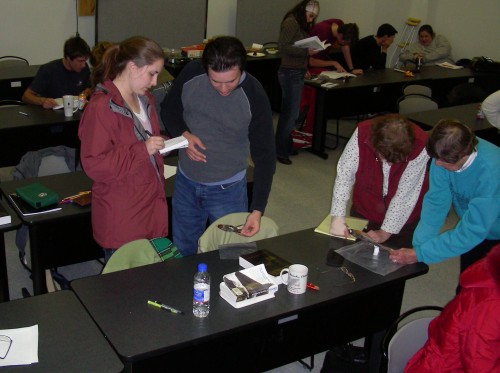|
|
|
WINTER
POPULATION MONITORING |
|
Week
5: November 28 - December 4, 2006 |
Welcome
to the McGill Bird Observatory weekly report. Click
here for a complete listing of our archives. Comments or questions are welcome at mbo@migrationresearch.org.
|
PICTURE OF
THE WEEK: |
|

Some of the participants in the first MBO ageing workshop poring
over specimens
and notes during the quiz.
(Photo by Marie-Anne Hudson)
-
|
| |
THIS
WEEK |
THIS
WINTER |
2006
TOTAL |
SITE
TOTAL |
| #
birds (and species) banded |
-- |
41 (8) |
4244 (84) |
9297 (96) |
| #
birds (and species) repeat |
-- |
13 (5) |
663 (39) |
1541 (52) |
| #
birds (and species) return |
-- |
1 (1) |
129 (22) |
198 (26) |
| #
species observed |
22 |
44 |
159 |
180 |
| #
net hours |
-- |
35.0 |
7569.7 |
13991.8 |
| #
birds banded / 100 net hours |
-- |
117.1 |
56.1 |
66.4 |
|
|
Note: table does
not include nocturnal banding (owls) |
Observers:
Marcel Gahbauer, Gay Gruner, Chris Murphy
Notes:
We skipped banding this week,
partly because suitable weather was limited, but also because much of
our time was devoted to preparing a workshop on ageing that we held on
December 2. For 5 hours on Saturday afternoon, MBO banders Marcel
Gahbauer and Marie-Anne Hudson led 23 workshop participants through the
process of learning to age birds by moult limits and other feather
characteristics. We were fortunate to have on hand the specimen
collection from the Canadian Bird Banding Office, which we used to
illustrate comparisons among species, and to quiz everyone at the end of
the day. We were very impressed not only with the large turnout,
but also with everyone's enthusiasm, and especially with how well the
lessons were absorbed. It's exciting for us to have such an eager
and capable group of banders in training, and we look forward to holding
further workshops on more advanced topics, as well as supplementing
these with more hands-on training during banding sessions.
Notable sightings for the week included the
winter season's first Red-shouldered Hawk, as well as another Northern
Harrier and a sighting of the (presumably) local Red-tailed Hawk and
Northern Shrike. Canada Geese remain remarkably abundant, with 379
recorded on the Thursday morning census. House Finches are still
the most abundant species at the feeders, with 39 observed the same
morning.
|

